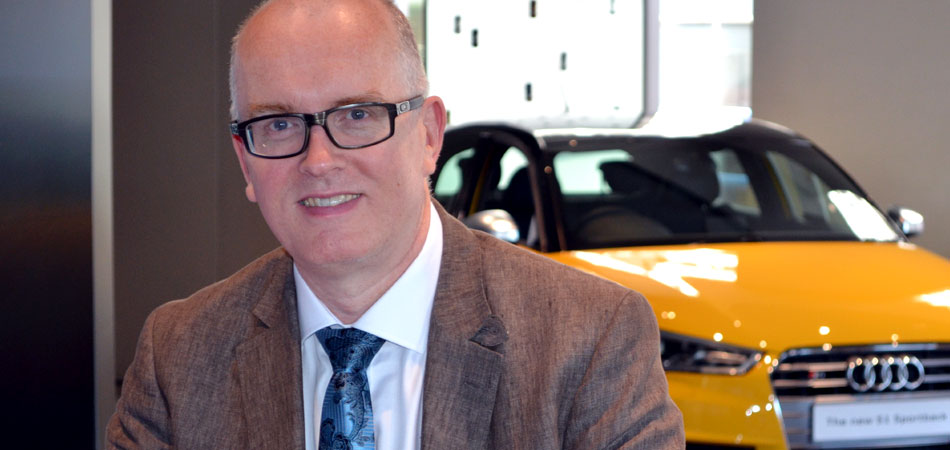
Supporting women through the messy middle of their careers
International Women’s Day may well be over, but progressive agency leaders remain focused on supporting women at every stage of their careers.
Nick’s responsibility encompasses marketing communications and digital, social, events and customer relationship management (CRM) activities nationally and at dealer level, along with product management and pricing


Tom Holmes talks to Nick Ratcliffe, Head of Marketing at Audi UK.
Nick’s responsibility encompasses marketing communications and digital, social, events and customer relationship management (CRM) activities nationally and at dealer level, along with product management and pricing.
He joined Audi UK following six years at British Telecom, most recently as marketing director for BT Business. Prior to BT, he had marketing communications, product management and operations positions at BMW GB, Citroen UK and Mercedes-Benz UK.
Nick Ratcliffe: Our role is to drive the sales of Audi cars and parts through increasing the desirability and consideration of the Audi brand and product offering.
We’re particularly focused on raising the centre of gravity of the brand with greater emphasis on the higher value and higher performance models in the range, and developing a 21st century approach to car retailing which embraces the opportunities presented by digital technology.
That’s alongside the areas that are probably common to almost every marketing role such as building a differentiated brand image, engaging our customers and greater use of marketing analytics to demonstrate ROI.
The Audi brand is in great shape in the UK but there are still significant opportunities in developing a greater understanding of the benefits of the quattro all-wheel drive system, increasing salience of the RS models from Audi Sport, our Audi Ultra CO2 efficiency and sustainability story, and the continuing flow of new technologies that bring Vorsprung durch Technik to life.
Nick Ratcliffe: Looking back it’s interesting to note that the most rewarding things have not been specific campaigns but in developing people who have gone on to take bigger roles, and developing brand strategies and communications models. I like to think that I’ve contributed to many of those businesses having a much clearer idea of what they stand for, who their customers are and how best to get their message across
Nick Ratcliffe: It’s about the contribution to the wider business – ensuring that marketing’s contribution is valuable and valued and ensuring that marketing people understand how what they do impacts on the rest of the business. One thing that concerns me is that too many marketing people risk limiting their career potential by operating in a marketing ghetto and not being prepared to spend some time in a different function. I believe I’ve got a much better perspective on marketing from those jobs I’ve held without marketing in the title.
Audi City is a new digital car showroom format that uses state-of-the-art technology to make clever use of precious city space. Nick Ratcliffe, Audi UK’s Head of Marketing said “visitors can experience every possible combination of the Audi range in a way never seen before and expect a previously unheard-of level of customer service”
Nick Ratcliffe: From a business point of view we have the arrival of some significant new products including the A3 Sportback etron which as a plug in hybrid based on a conventional car offers exceptional performance and economy with none of the compromises of range or styling inherent in most alternative fuel vehicles. We also have the arrival of the third generation Audi TT. The TT was the model that redefined Audi’s image in the UK so it’s a once in seven years opportunity to make a big brand statement.
The ever increasing breadth of the product range is a challenge though in increasing the complexity of the product range. We’re looking at how we can take the learnings from Behavioural Economics to simplify the offer for customers, and how we can use digital tools both online and in our Audi Centres to make the purchase and ownership experience more straightforward and enjoyable.
Nick Ratcliffe: Much of the work I’ve been involved with at Audi over the past 15 months is yet to materialise in the market, but I was particularly pleased with the integrated campaign we ran through the winter on the quattro all-wheel drive system. We achieved a great level of integration from showroom, through customer comms and digital content to TV. A global TV asset was very successfully adapted to create a piece of work that resonated with a UK audience. And most important of all, we saw a spike in order take for models fitted with quattro.
I’m also proud of the work the team has done on unifying all the communications our customers receive on purchasing a new car into a single welcome pack. It sounds like a simple task, but managing all the data feeds from the dealer, the finance company, breakdown assistance provider, and the complexity of the model range means we have over 8,000 variations of the personalised pack.
Nick Ratcliffe: I firmly believe that Integration is the client’s job, and that as the client we need to create the environment which allows agencies to collaborate effectively. Specialist agencies have the depth of talent and experience to attract the best people.
Nick Ratcliffe: It would never be a deciding factor. An agency with poor thinking and the wrong chemistry would never get onto a shortlist because of awards, and an agency with the right chemistry and great thinking wouldn’t be excluded for a lack of awards.
That said, awards are great recognition for agency and client teams for the work they’ve done particularly if they’re robustly judged effectiveness awards rather than the more subjective awards focused entirely on the creative execution.
Nick Ratcliffe: We have much greater challenges elsewhere
Nick Ratcliffe: My philosophy is that the most fruitful agency relationships are true partnerships and that ending them is not a step to be taken lightly. You need the sort of relationship where if things aren’t going well, you can speak to the agency ownership and ask them to make changes. If the agency is doing great work for other clients then you need to look at your own people and processes – I do subscribe to the old saw that the client gets the advertising they deserve. Equally, if the agency isn’t delivering for any of its clients then it’s time to move on.
The relationship between Audi and BBH is now over 30 years old and is a great example of how an agency and client can grow and develop together.
Nick Ratcliffe: By talking to like-minded people in the industry and reading the trade press.
Nick Ratcliffe: The important part of the process is up front, being very clear about what you want, and investing time in the chemistry meetings to ensure these are people who will enjoy working with your business.
The last major review we conducted at Audi was the selection of a new digital partner. The key factor was early recognition that our primary challenge was in back-office systems integration. That led us to focus on potential partners with a track record of success in delivering ecommerce solutions for high street retailers rather than traditional creative-led digital marketing agencies. That led to the appointment of Salmon who have brought a healthy dose of commercial pragmatism to our core agency group.
Nick Ratcliffe: Yes in terms of extending the remit of an existing partner
Nick Ratcliffe: That they “get” our business and our brand and that they can deliver exceptional thinking, creative and results
Nick Ratcliffe: This year’s Le Mans 24-hour marathon has just been won by a pair of diesel-powered hybrid Audi prototypes which covered over 6,300 miles over the course of the race.
Audi has been using Le Mans as a test laboratory to support future production line developments for many years. TFSI petrol direct injection appeared for the first time at the 2001 race, Audi was also the first manufacturer to win at Le Mans with a diesel engine in 2006, and introduced hybrid power with the R18 e-tron quattro in 2012.
The two Audi R18 e-tron quattro race cars which won one of the toughest races in recent Le Mans history are the ultimate examples of Audi ultra technology. Ultra is the umbrella for everything Audi is doing to improve efficiency from lightweight construction, and aerodynamics to engine efficiency. The ultra mentality touches virtually every stage of development in the roadgoing model programme, but is most immediately evident in the new, exceptionally economical A4, A5 and A6 TDI ultra models launched in the UK this year.
This year the Le Man cars’ Matrix LED headlights which incorporate individual LEDs that can be switched on and off or dimmed individually to “divert” their beams around oncoming traffic, also incorporate laser light to dramatically improve vision for the driver. Matrix beam was introduced on the A8 earlier this year and the first road-going Audi model to feature laser light – the R8 LMX – is already on sale.
Looks like you need to create a Creativebrief account to perform this action.
Create account Sign inLooks like you need to create a Creativebrief account to perform this action.
Create account Sign in